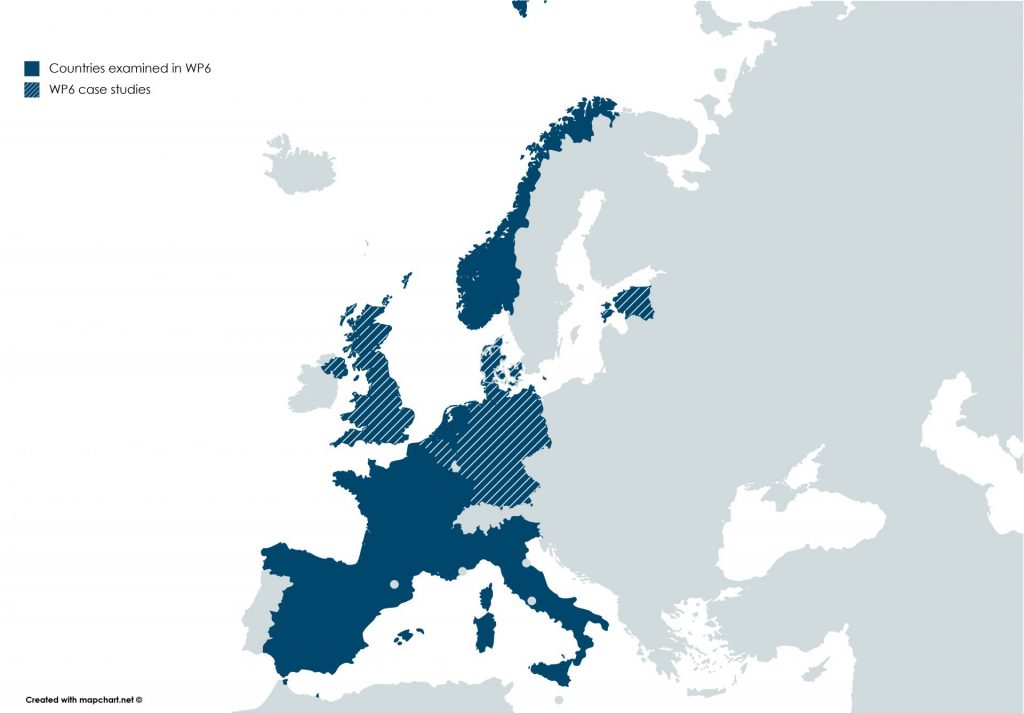Practices of Internal Collaboration for Service Delivery (Work Package 6 – WP6)
Led by Hertie School (Germany), this work package is running from February 2019 until May 2021.
The WP6 TROPICO team studies collaborative public management practices in order to advance digital government and improve the delivery of innovative public services. Our research focuses on how governments can better link and improve service delivery across levels of government (vertical dimension) and between organisations from different domains (horizontal dimension).
More specifically, WP6 investigates the following research questions:
- Is there a paradigm shift from New Public Management to Networked Governance, or do different reform paradigms co-exist in the context of digitalisation?
- How is collaboration perceived in the context of digitalisation strategies? Has the relevance of collaboration increased?
- Has collaboration changed with regard to the types of actors, the motives of collaboration, the steering modes and instruments?
- Which coordination mechanisms/arrangements (institutional design) are applied in contexts of inter-governmental collaboration to digitalise and improve public service provision?
- Which leadership styles, competences and challenges do public managers perceive in such collaborative contexts?
To answer these questions, the WP6 team analysed:
- National e-government/digitalisation strategies in eight countries
- Collaboration arrangements and dynamics in the context of government online platforms and smart city approaches (10 case studies from 5 countries)
- More than 60 practitioner interviews in five countries on leadership challenges in context of collaboration and digital transformation
Research
The first step of the research in Work Package 6 was a meta-analysis of sixteen digitalisation strategies published in eight European countries: Estonia, France, Germany, Italy, the Netherlands, Norway, Spain, and the UK. Each country team identified the initial and the most recent digitalisation strategy in their country, which enabled comparison over time. Although sustainable changes can only be realised through actual implementation, these policy documents shed important light on the visions, goals, and underlying assumptions that governments have towards collaboration in the context of digitalisation. Based on questionnaires filled out by TROPICO partners and qualitative content analysis of the strategies, the WP6 team provided insights on i.e. the role of steering and control in the strategies, and challenges and success factors for government digitalisation. See D6.1 Meta-Analysis of e-government/digitalisation strategies.
The WP6 team developed a policy brief with recommendations on success factors for digitalisation directed towards policymakers and public managers in charge of designing and implementing digitalisation strategies, with a special emphasis on the role of leadership, common vision, collaboration, and networking skills among public sector managers. See D6.2 Policy Brief - Internal collaboration as a cornerstone of national digitalisation strategies.
In the next step, the WP6 team conducted ten case studies on collaborative management for government digitalization in five countries: Belgium, Estonia, Denmark, Germany, and the UK. Each country team investigated two cases, one on the implementation of a national government-wide portal towards the EU Single Digital Gateway, and one on the implementation of a smart city strategy. The researchers conducted an extensive document analysis, as well as 62 interviews with experts engaged in collaborative public networks and driving practitioner recommendations for successful collaborative management. See D6.3 Comparative case studies on collaborative management for government digitalisation and public sector innovation.
An ensuing literature review formed a basis for developing five propositions explaining the key aspects of collaborative digitalisation as well as the role of structure, design, and leadership practices for successful completion of ICT projects. The findings of the WP6 case studies on online digital platforms and Smart Cities were used as a basis for testing the five propositions. See D6.4 Research report on collaborative management for ICT enabled public sector innovation.
Results and findings
The results of the meta-analysis of sixteen digitalisation strategies show that, contrary to widely voiced claims, a “networked governance” is not emerging in the era of digital government. In fact, the way in which digital transformation of the public sector is put forward in the strategies often relates to hierarchical patterns of command and control. The implementation of digitalisation strategies is mainly steered centrally by political leadership or a core government organisation, while non-state actors do not play a significant steering role. Furthermore, while the most recent strategies put a stronger focus on collaboration with external actors, the intensity of collaboration remains relatively weak. The strategies stated competing interests, silo structures, and increasingly fragmented government sectors as continuing challenges that need to be addressed through measures of institutional design and leadership.
The analysis on the dynamics and challenges of intergovernmental collaboration substantiates and extends some of the findings of the meta-analysis with empirical evidence from ten case studies. It reveals that implementing collaboration for digital solutions is resource intensive, demanding and needs continuous attention and investments. Complexity, risk and power imbalances are three particular strains, often hindering the successful completion of collaborative ICT projects. However, adequate approaches and experiences exist on how to meet these challenges also confirming earlier findings from the research report D6.1. Indeed, carefully chosen institutional design and leadership styles have been found to be key to overcoming such obstacles. More specifically, central coordination capacity, wide-scale inclusion, ground rules and process legitimacy, as well as a focus on trust and interpersonal relationships were all design characteristics that proved effective in handling collaborative dynamics.
Scientific publications
The WP6 research will be concluded by the publication of journal articles, a joint edited book together with findings from WP7 and a special issue in 2021.
The team
WP6 is led by Hertie School (Germany) and includes seven partners: Cardiff University (The UK), Erasmus University Rotterdam (The Netherlands), Tallinn University of Technology (Estonia), Roskilde University (Denmark), University of Antwerp (Belgium), and University of Zaragoza (Spain).




















